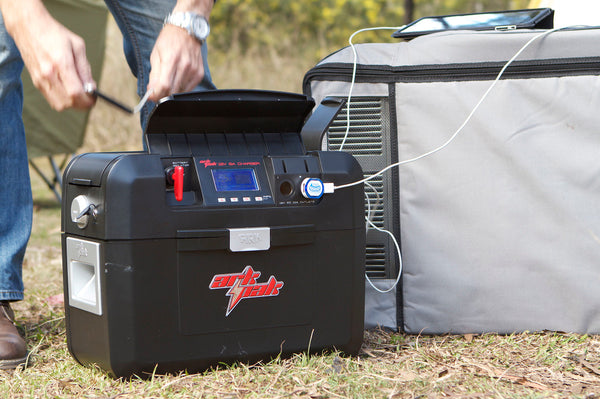Small portable fridges - like the ARB Fridge/Freezer - are popular for a lot of reasons: They're rugged, they keep food and drinks below 40 degrees fahrenheit (thermoelectric coolers often can't get that cold), and they require only a small amount of electrical power. As you can read in our article about the ARB Fridge/Freezer and Battery Life, a smaller 37, 50, or even 63 quart ARB fridge/freezer (for example) uses less than one amp per hour to keep cold. It can be connected to an ArkPak and, depending on the size of your battery, your fridge can run for the better part of a week.

But the question is, how do you keep your fridge/freezer running indefinitely? Let's say you're camping out for a few weeks and you really hate warm drinks. Is there a way to keep your ARB fridge running day in and day out?
The answer: Yes. Here's how you do it.
What You'll Need
In order to setup your own source of continuous power for your ARB fridge/freezer, you'll need:
- One deep-cycle battery with at least 80ah of capacity
- An ArkPak
- A 60W solar panel (or greater) to collect power
- A charge controller (if your solar panel doesn't come with one)
Here's the setup you'll use:
First, you'll need a solar panel. If we assume that the ARB fridge you're using requires about 250W of power per day (total), and if we assume we only have 4 hours of quality sunshine per day (a very conservative estimate), than a 60W panel ought to be able to collect enough power to recharge whatever power your fridge uses per day.
Of course, 4 hours of quality sunshine is a bit pessimistic. While "quality" sunshine (eg sunlight with no clouds or haze) isn't always guaranteed, most solar panels are able to generate at least some power when the sun is hiding behind the clouds. Even if we have 12 hours of bad sunlight, a 60W panel should be able to collect 200-300W per day.
Next, you'll need to hook your solar panel up to the ArkPak's side terminals OR - if your panel doesn't have a built-in charge controller - you'll need to hook the panel up to the charge controller, and then the charge controller to the side terminals.
The Cost and The Value of Continuous Power
Many of the people who look at the setup we've described above add up the costs of all the gear, see the price, and start to question the value of this sort of setup to investing in a generator. While we can't offer any budget advice, we can tell you a few things that will influence your cost calculations.
First, let's add up the potential costs:
- One deep-cycle lead-acid batteries at ~$120
- The ArkPak at $375
- A 60W solar panel ($745 for our folding, highly portable panel, with 80W mono-crystalline panels available for about $100)
- A charge controller (not needed if you use our portable folding panel, about $25 if you go with a mono-crystalline panel)
The total can range from as little $620 (with a large, not-very-portable mono-crystalline panel) to $1,240 (includes our folding, portable panel). Not a trivial amount of money, and somewhat expensive compared to a "cheap" gas-powered generator. But here's the thing:
- What we've described is a completely self-sustaining system. You're 100% off the grid with our setup.
- You don't have any operating costs - you're not buying gasoline every time you need power.
- There are no moving parts and very few modes of failure. As long as you protect your system from the elements, the battert should last at least 3 years (potentially 5), and the rest should last a decade or two.
- The ArkPak has a built-in inverter and multiple power outlets...you can run more than just a fridge/freezer. It can keep your electronics charged, provide lighting, etc.
Whether you're an overlander interested in a system that will reduce the burden on your vehicle's electrical system, a boater that's trying to find a way to keep your beer cold for a long boating weekend, or a prepper interested in a self-sustaining power system in case of emergency, we hope you'll consider this system carefully.
Related:
Check out this post on TacomaHQ where the author hooks up an inexpensive mono-crystalline panel to the ArkPak: http://www.tacomahq.com/3326/portable-solar-power-off-grid/
